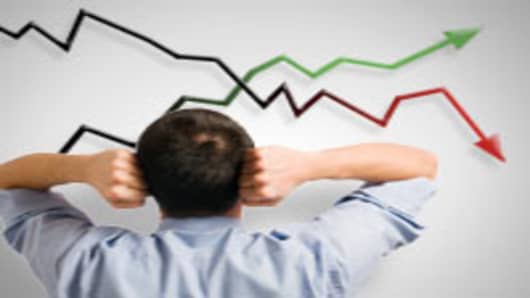The market meltdown of recent days has nothing to do with the S&P downgrade of US debt and is all about the economy according to noted bear, Albert Edwards, a strategist at Société Générale.
"The simple fact is that the global economy is falling back into recession or indeed is already in recession . Equity markets were sliding before the downgrade and bond yields were reacting as one would have expected to the dire economic data" said Edwards in a research note on Tuesday.
Whilst conceding that the downgrade may have caused the S&P 500 to breach critical support at 1250, Edwards is predicting the market could retest these levels before it "ultimately meets its date with destiny".
Given weak second quarter GDP data in the US Edwards believes the impact of QE2 on actual growth was small and thinks the "adrenalin rush of QE3" will wear off “even quicker than QE2."
"There are still some diehard happy clappies out there who think we are going to avert recession and the markets will recover," he said. "Yet US GDP growth has now fallen below the well known 2 percent stall speed, below which the economy does not seem to be able to regain altitude but instead crashes directly into recession."
Having faced "ridicule, derision and utter contempt" when predicting the S&P 500 could hit 400 in May, Edwards hit out at those he deems "happy clappies"
"In the same way that a country is said to get the government it deserves, I believe the market gets the macro commentators it deserves: i.e. perpetually bullish analysts, taking no personal risk with their never-ending consensus chatter" said Edwards. "I and many others have been pointing out for a long time now the simple fact that the global economy has been living way beyond its means for years.
"A massive transfer of income to the very rich has occurred while middle class real incomes stagnated. The middle classes only tolerated this because Central Bankers created housing booms to keep the impoverished middle classes borrowing and spending to give them the illusion of prosperity and stop them from revolting," he said.
With private debt put onto the balance sheet of governments following the 2008 banking collapse, Edwards believes the new debts are unsustainable in the hands of politicians, as they were in the hands of the people and the bankers.
"The bulls still point to booming US profits to sustain the market. The problem is that US whole economy profits growth is slowing extremely rapidly and this tends to lead stock market measures. Profits growth is the biggest determinant of corporate expenditure growth which helps explain the weakness in business spending this year," he added.



